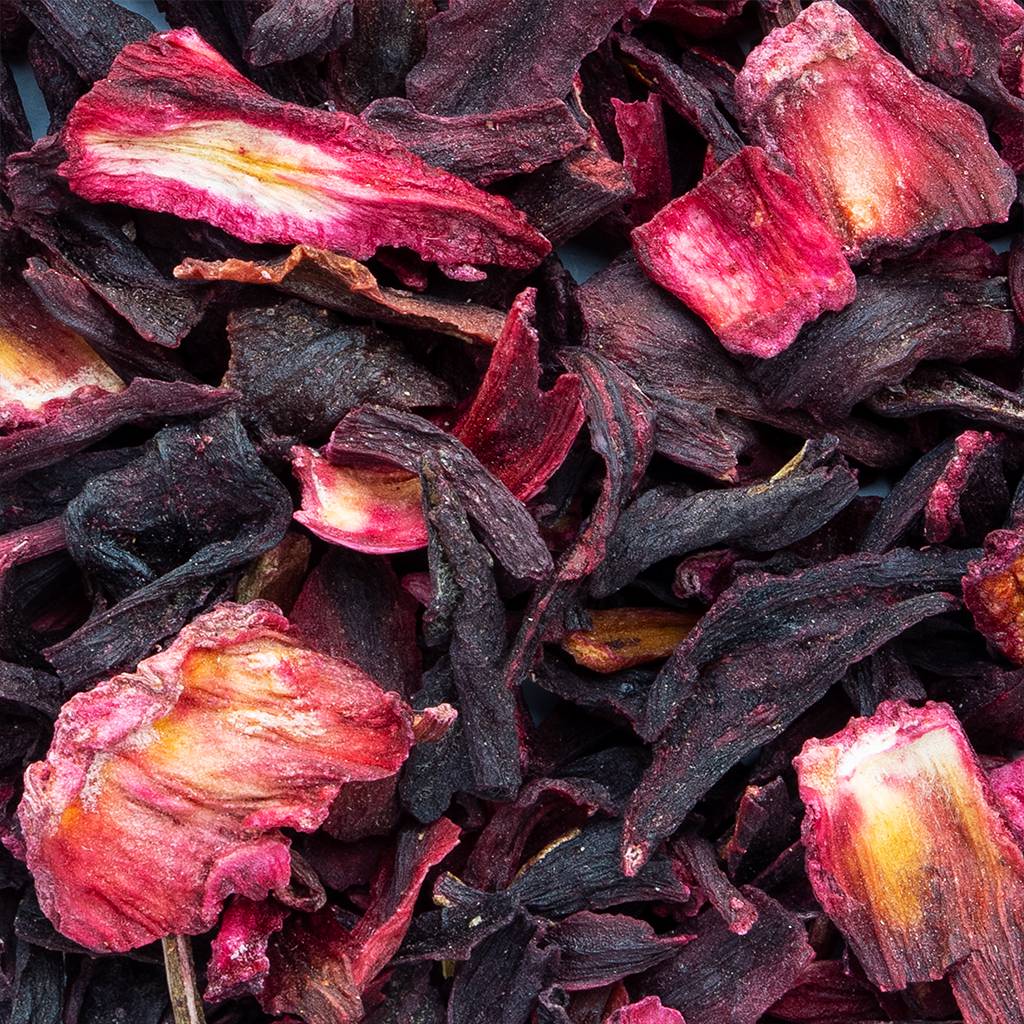Hibiscus sabdariffa, also known as karkade, bissap or roselle, is a plant with numerous health benefits. This national flower of several countries in Africa and South Asia offers an ideal beverage with multiple therapeutic virtues.
What is hibiscus? A plant with multiple names
Hibiscus belongs to the Malvaceae family and bears the Latin name Hibiscus rosa-sinensis or Rosa sinensis depending on the variety. This herbaceous plant originates from West Africa and is widely known throughout the world under different names: country sorrel, roselle, or Chinese rose.
In Burkina Faso and South Korea, this plant is traditionally consumed for its medicinal properties. Studies have shown that hibiscus possesses numerous benefits for the body.

Dried flowers, fruity flavor, and natural benefits!
What are the health benefits of hibiscus?
Naturally regulate blood pressure
One of the main benefits of hibiscus concerns blood pressure. A study found that regular consumption of hibiscus infusion can help reduce blood pressure in people suffering from high blood pressure. The hypotensive effect of this plant helps regulate blood pressure naturally.
Recommended dose: Consuming 2 to 3 cups of hibiscus infusion per day can promote better blood pressure regulation. However, it is recommended to seek advice from a medical professional before any therapeutic use.
Improving blood circulation
Hibiscus helps to improve blood circulation thanks to its richness in antioxidants and flavonoids. This beneficial action helps fight against heavy legs and promotes better functioning of the cardiovascular system.
Supporting the immune system
Rich in vitamin C and antioxidants, hibiscus helps to support the immune system. Its antioxidant properties help to fight against free radicals and oxidative stress, the main causes of cellular aging.
How does hibiscus aid digestion?
Hibiscus possesses remarkable digestive properties. This plant helps to improve intestinal transit thanks to its mucilages and pectin. Its mild laxative effect helps to relieve bloating and promotes better digestion.
Studies have also shown that hibiscus can help reduce cholesterol levels and triglycerides, thus contributing to improving overall digestive health.
Can hibiscus reduce blood pressure?
Yes, numerous studies have shown that hibiscus helps reduce blood pressure. The diuretic effect of this plant promotes renal elimination and helps decrease high blood pressure.
This hypotensive property makes hibiscus an interesting natural dietary supplement for people suffering from hypertension. However, it is important to respect the precautions for use and consult a health professional.
What are the effects of hibiscus on the skin?
Hibiscus possesses remarkable cosmetic properties for skin and hair. Its anthocyanins and antioxidants help to improve skin radiance while relieving itching and irritations. This plant also helps to fight against dandruff and promotes better skin hydration.
The anti-inflammatory action of hibiscus also helps to soothe skin problems and reduce signs of skin fatigue.
How to prepare a hibiscus infusion?
Traditional preparation
To prepare a quality hibiscus infusion, here is the traditional recipe:
- Bring water to a boil (boiling water)
- Add the dried hibiscus flowers (1 tablespoon for 250ml of water)
- Let steep for 15 to 20 minutes
- Strain the preparation
- Consume hot or cold
Traditional bissap recipe
Bissap or karkade is the African traditional drink based on hibiscus. This bright red herbal tea offers a refreshing tangy taste.
Ingredients for 1 liter of bissap: you will need 50g of organic dried hibiscus flowers, 1 liter of hot water, and optionally fresh mint or ginger to flavor your drink.
Preparation: Pour boiling water over the flowers, then let steep for 2 hours before straining. This decoction can be consumed hot or cold according to your preferences.
Does hibiscus help with weight loss?
Hibiscus can help with weight loss through several actions:
Diuretic and detoxifying effect
The diuretic effect of hibiscus promotes the elimination of toxins and renal elimination. This property helps to reduce water retention and supports kidney functions.
Effect on metabolism
Studies have shown that hibiscus can help regulate metabolic syndrome and promote weight loss through its action on fat metabolism.
What are the dangers of hibiscus?
Potential side effects
Although hibiscus is generally safe, some side effects may occur. There is a risk of hypotension if the plant is consumed in excess, as well as possible interactions with certain medications. Some sensitive people may also experience digestive issues.
Precautions for use
Special caution is necessary for pregnant or breastfeeding women. It is also important to consult a medical professional before any use, particularly if undergoing treatment for hypertension. In any case, it is advisable to respect the recommended doses to avoid any adverse effects.
Choosing quality hibiscus
To benefit from all the advantages of hibiscus, it is essential to choose a high-quality organic product with loose dried flowers rather than in tea bags. Opt for hibiscus sabdariffa with an intense red color and a controlled and traceable origin to ensure quality.
Organic hibiscus retains all its medicinal properties and offers an authentic taste for a superior quality herbal tea.